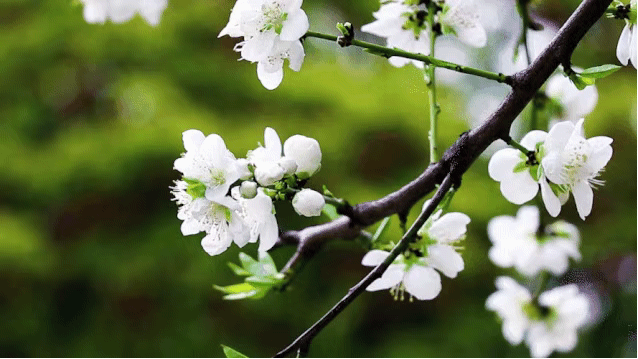Spring and the beauty of music in Tang poems
(Spring reading Tang poems, quietly enjoying music)
The Tang people are attached to spring, depicting the spring scene with a clever pen, expressing their inner delicate emotions in the process of perceiving nature, and integrating musical elements into their poems to compose "spring movements". In the vast sea of Tang poems, there are many poems related to spring, including the gentle spring in the sound of the side flute, and the spring color in the sound of the pastoral piano... Today's Lichun, in the "Qunfang Genealogy", it is recorded: "Li, the beginning of the construction also." Spring begins and builds also. "It is when the wind and the sun are warm, and everything grows, let's look for the music and spring in Tang poetry."
Tang Dynasty poets were keen to borrow the sound of musical instruments to write about the lingering sentiments of spring and show deep and subtle feelings. Liu Xun wrote in "Wenxin Carved Dragon Searching": "In the Spring and Autumn Dynasty, yin and yang are miserable, the search for color moves, and the heart is shaking." "Spring to autumn, Shaoguang is easy to pass away, the literati and inkers perceive nature, and in the communication with all things, the feelings of spring are condensed in poetry."
Spring in Tang poetry, beauty in qiangguan leisurely love long -
The Qiang flute is a commonly used instrument in Tang poetry, with a melodious and mournful tone, "the dragon does not see itself in the water, and the sound of cutting bamboo blows is similar" (Eastern Han Ma Rong's "Flute Fu"). The literati of the Tang Dynasty took its sad meaning into poetry, such as Wang Zhizhuo's "Liangzhou Words":
The Yellow River is far above the white clouds,
A lonely city of Wanlingshan.
Why should Qiang Di complain about Yang Liu,
The spring breeze does not close the jade door.
Borrowing the mournful and mournful sound of the Qiang flute, the sorrow of the border guards was expressed, and the vast spring color was even more desolate. Gao Shi's "Plugged in and Listening to the Flute" is composed from the song, and in the distant flute sound, he expresses his nostalgia for the spring scenery of his hometown:
Snow net Hu Tian Mu Ma also,
Yueming Qiang Di Shu building.
Ask where the plum blossoms fall,
The wind blew all night all over the mountain.
On the night of the moon, the Qiang flute is leisurely, and the sound of a flute is intoxicating, and many soldiers are aroused by this mournful and moving "Plum Blossom Fall" with infinite sorrow.
Spring in Tang poetry, the elegance and beauty of beauty in the wisps of piano music-
The Tang Dynasty literati were good at the sound of the guqin, and the delicate beauty of spring was sent to the piano, and Li Baizuo's "Substitute Lover" integrated the piano tone and sentiment into the beautiful spring scenery:
Shimizu did not move, and the peach blossoms were on the shore.
The peach blossoms are water-colored, and the waves shake the spring light.
I am happy to be beautiful, and the son pours out my article.
The wind blows the green piano to go, and the curved degree of the purple mandarin duck.
Once a fish in the water, now it is a bird with two branches.
Mourning long chicken chirping, night and night up to five dawn.
Fold the acacia tree and give it to the heart of the know.
The water cannot be collected, and the clouds are difficult to find.
The death of the peach, the spring color, the joy of the two loves, the romantic and beautiful feelings, conveyed through the lingering piano tone, make people feel excited. Wang Weizuo's "Zhuliguan" finds inner peace in the melodious sound:
Sitting alone in the seclusion, playing the piano and whistling.
The people of the deep forest do not know that the bright moon has come to take pictures.
Deep in the mountains and forests, literati and gentlemen wandering between the mountains and rivers, a guqin, a desolate life, in the melodious sound of the natural world and music, compared to the earthly hustle and bustle of the day, the tranquility of this spring night is particularly rare.
Spring in Tang poetry, the beauty of the flexible nature between low chants and shallow singing -
Most of the sentences in Tang poems are used by poets to entertain and tell the feelings of spring in low chants and shallow songs. Absolute sentences can be sung in unison, which is the preferred style of the literati to enter the music with poetry, "The Tang movements all use the poems of the contemporary scholars, and all the absolute sentences are also" (Dong Wenzhuo's "Four Scores of Tone"). Wang Wei's seven-piece poem "Sending Yuan Er envoy Anxi" sighed nine songs of sorrow between the ups and downs of the flat and the poor:
Weicheng towards the rain and light dust,
The guest house is green and willow-colored.
Advise the king to drink a glass of wine,
There is no reason for the West Out of Yang Pass.
Yangliu Qingjiang level,
Smell the singing on the Lang River.
East sunrise west rain,
The road is clear and clear.
The willows are green and green, the spring is thick, and the crimson on the cheeks of the girl who has just opened the love sinus is like this boundless spring color, which is particularly cute.
Tang poems write all the colorful love rhymes of spring, and in the love rhymes of spring, they naturally integrate with the agility of music, giving birth to rich and delicate feelings. Tang poems, spring moon light, spring wind qing, spring in the rhythm of music, blooming. Spring is coming, let's start from the beautiful rhythm of Tang poetry, walk in hand, the benefits of spring a year, sing Tang poems, and quietly enjoy the beauty of life!
(ZHANG Kai. Read Tang poems)
